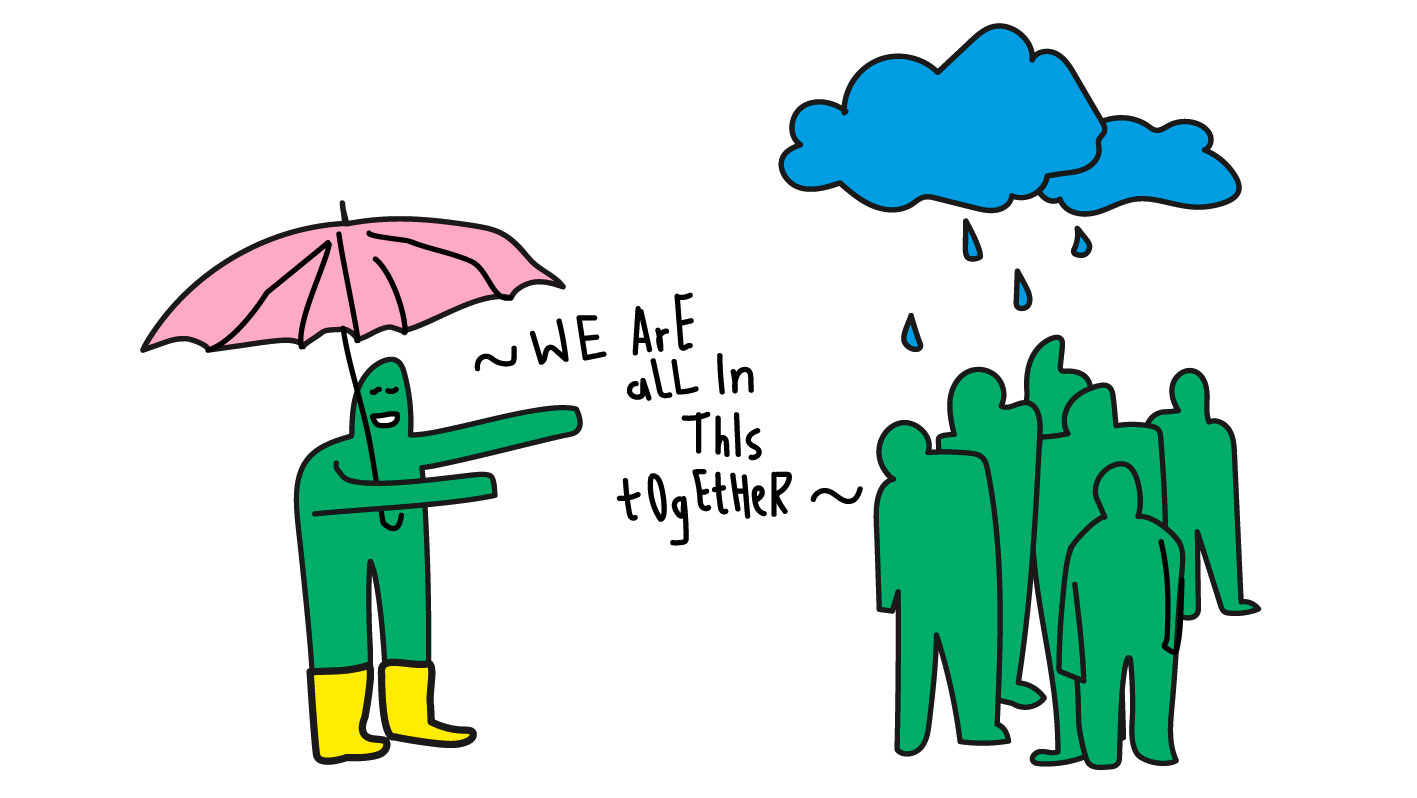Illustration: Dominika Huber
Within the past ten months the Twitter account Business Teshno rose to a major critical voice in the scene, relentlessly calling out artists performing at legal and illegal plague raves all over Europe raising important questions about individual responsibility in the time of the pandemic and beyond. In their piece for our REWIND2020, the group operating from Berlin explains what actual solidarity means within the scene and beyond.
Let us be very clear from the beginning this article would not have been possible without the hard labour and caring love of Black women for each other and their ancestors. They are called Sojourner Truth, Ida Bell Wells-Barnett, Fannie Lou Hamer, Toni Morrison, Claudia Jones, Olive Morris, Audre Lorde, Katharina Oguntoye, May Ayim and by all those other countless names that our mothers remember. The perspective we take is particularly informed by bell hooks’ work. The article is an attempt to apply her writings to the context of the electronic music industry.
If the last year has taught us anything, then that solidarity is as much needed as ever. But what does it mean to stand in solidarity with workers in precarious jobs, with migrants who seek refuge, with women who work in precarious jobs, with women who experience domestic violence, with women of colour who are the backbones of their family, with black people who are always at danger of police brutality, with black trans women who are murdered in pandemic numbers?
In her essay Sisterhood: Political Solidarity between Women, bell hooks, a feminist theorist, cultural critic, artist, and writer, gives an unmistakable answer to these questions. She contends that “[t]he idea of ‚common oppression‘ was a false and corrupt platform.” “Solidarity is [also] not the same as support. To experience solidarity, we must have a community of interests, shared beliefs and goals around which to unite, to build Sisterhood. Support can be occasional. It can be given and just as easily withdrawn. Solidarity requires sustained, ongoing commitment. In feminist movement, there is need for diversity, disagreement and difference if we are to grow.”
Let us take her powerful words and see how they relate to the electronic music industry. Too often have we heard the slogan “we are all in this together” by now, pretending that all people are equally oppressed. In November, Awakenings gave a shot at this trope. It read “Together we are techno” and came with a branding kit as well as a minute of pathos. We might call their initiative hashtag-$olidarity but it has nothing in conjunction with solidarity other than the nine letters in the end.
From bell hooks one can learn that ‘common oppression’ is an obstructive concept because it mystifies the real differences that exist between us: “[people] are divided by sexist attitudes, racism, class privilege, and a host of other prejudices.” Putting on the same white-only business techno line-up as always in the midst of the BLM protests in June was more than enough of a proof that Awakenings does not seem to care at all about these real differences.
Moreover, ‘common oppression’ is not only false but also highly problematic because it entails the misguided idea that we must bond over shared victimization. bell hooks rejects victimization for three reasons. First, it directly reflects male supremacist thinking. “Sexist ideology teaches women that to be female is to be a victim.” Second, it allows for the shirking of one’s responsibility “in the maintenance and perpetuation of sexism, racism, and classism”. Third, it is often the most privileged and powerful who are “most eager to be seen as ‚victims’”. There are many examples of these patterns in the electronic music industry. In 2020, numerous big DJs have seen themselves as victims of Business Teshno and “cancel culture”.
This is not surprising. bell hooks reminds us that those who are really exploited cannot afford to be a victim as their daily “survival depends on continued exercise of whatever personal powers they possess.” If we are truly interested in standing in solidarity with one another, then we must do so “on the basis of shared strengths and resources” and not on victimization. Allergy Season and Discwoman have followed this call with the third edition of their Physically Sick series. They joined their powers to raise over $16k for organizations that fight police brutality and gentrification.
Berlin Collective Action also started a fundraiser. Supported by 40 nightlife organizers in Berlin, they have raised over €50k for those most impacted by COVID-19 pandemic: “womxn, queer, trans and non-binary people, low-income gig workers, people with migratory backgrounds, BIPOC, sex workers, the immunnocompromised, the disabled and those who are unsafe in quarantine.”
Another example is the platform Oramics. Since the Polish government has begun a campaign of homophobia and passed a number of anti-LGBTQ+ policies, they have relentlessly organized in opposition to these alarming developments. The members of Oramics have not only joined peaceful protests but also released a 125-tracks compilation with New York Haunted label Drvg Cvltvre and Berlin-based Uferlos Studios in support of Polish queer organizations.
For bell hooks, sharing strengths and resources is only possible, however, if we overcome our tendencies to create splinter groups. We must not allow a situation where a few “protect one another while demonstrating hostility (usually through excessive trashing) towards [those] outside the chosen sphere” since this has always been a core element of patriarchy. Unfortunately, the creation of exclusive groups has been a constant in the electronic music industry. Exclusivity has almost become the industry’s core principle. To this day, there is not much cooperation among clubs, booking agencies and festivals. This has become particularly clear during the pandemic when it would have been helpful to speak with one voice.
Arguably, there are cases where exclusivity has brought some of us safety and protection but has it really brought us the safety and protection we have hoped for? 2020 has shown us that we must stand in solidarity to fight multiple pandemics apart from COVID-19. One of them is the global rape pandemic. “According to UNICEF, around 120 million girls worldwide, just over 1 in 10, have experienced “forced intercourse or other forced sexual acts” at some point in their lives.” Additionaly, WHO data reveals that even 35 per cent “have experienced either physical and/or sexual intimate partner violence or non-partner sexual violence.” Given its overly hierarchical, patriarchal, men-dominated, capitalist structure, the numbers in the electronic music industry might be even higher. This year has not proven otherwise.
Besides sexism, racism has been the other major pandemic. Let’s just imagine for a second what a world would look like if governments started to fight racism with as much force as they fight COVID-19?! As Roshan Chauhan has researched in great detail in his article “A Letter to RA and the rest of the UK music press” structural racism has undeniably been an essential obstacle to solidarity in the electronic music industry.
bell hooks warns us that we must never join a movement that liberates only one part of ourselves but not another – let’s not forget that in many parts of the world “white supremacy has always been as great if not a greater priority than maintaining strict sex role divisions.” Hence, she contends that it is not sufficient to discuss race privilege or to “listen and respond to non-white women discussing racism without changing in any way [the hegemonic structures].” As DJ Dee Diggs has unpacked so powerfully in her article “What Went Wrong at De School” the former Amsterdam club is one of this year’s most notorious examples but in no way an exception in the industry.
Finally, we must also “criticize and repudiate class exploitation” if we want to stand in solidarity. By giving the illustrative example of someone “who takes a less privileged ’sister‘ to lunch or dinner at a fancy restaurant,” thereby admitting class but not giving up class privilege, bell hooks shows us how it cannot be done. Moreover, she adds that [w]earing second-hand clothing and living in low-cost housing in a poor neighbourhood while buying stock is not a gesture of solidarity.”
Again, too often have we seen these exactly same patterns in the electronic music industry. In October this year, the Arts Council England allocated £76 million to 589 organizations to compensate for the financial losses due to the pandemic. While the applications of a number of iconic clubs in London such as The Egg, Studio 338, Oval Spaces and The Pickle Factory were rejected, Resident Advisor received £750,000 in round 1. In his recent article “On Resident Advisor’s Culture Recovery Fund”, Mathys Rennela highlights that the for profit company committed itself to diversity in the fund application but “previously failed to properly report on the diversity goals [it] intended to achieve this summer,” especially with respect to Black communities.
Boiler Room Limited is another big for profit company that was granted £791,652 in round 2 (600% of what all organizations/companies would have received under the principle of equal distribution). Given Boiler Room’s history with the Arts Council England, this is not surprising at all. In 2017, the for-profit company, with US-based Conegliano Ventures as one of the shareholders, had already received £297,298 from the “Ambition For Excellence“ grant to stream the 2018 Notting Hill Carnival. Given the shareholder structure of the company, let’s not be fooled by gestures of $olidarity.
The streaming giant Spotify is yet another example of the government’s neoliberal agenda in preferably supporting big business. The $40 billion market cap valuation company awards the biggest names in Techno with exclusive deals while the rest of the industry has to make a living from the tiny payments Spotify usually pays. To put it in another way, artists and independent labels have to compete against multimillionaire backed corporations. By now, Spotify has become so big of a streaming platform that no one can really opt out. This is because opting out comes with the social penalty of losing exposure. Although Spotify may argue that this is where its value for most artists lies, we all know that exposure does not necessarily translate into an income. If the new followers only stick with Spotify and do neither buy the tracks nor go to concerts nothing is won for the artist. It is long overdue that artists follow the example of the Music Workers Alliance (MWA) or the Union of Musicians and Allied Workers (UMAW) and join the global movement for workers’ rights.
Let us say it loudly and clearly again in the words of bell hooks: “SOLIDARITY IS NOT THE SAME AS SUPPORT“. This year, we have indeed experienced a lot of support. We have seen countless black squares on instagram, we have also seen big DJs and labels changing their names and the gates of Berghain turn black. But instagram posts only take a minute, new names remain the old ones in people’s mind if they are not constantly filled with the politics that led to their change and paint falls off at some point. This is not to say that support isn’t a first step in the right direction. As bell hooks tells us, it is worth nothing, however, without a sustained, ongoing commitment. “Acknowledgement of racism [as well as sexism and classism] is significant when it leads to transformation”, when the ownership structure in the electronic music industry changes, for example.
According to bell hooks, we must not forget that real transformation will only come about if we confront our disagreements. It would be false to think that solidarity merely means “hanging out in groups where the participants are alike and share similar values.” She instead argues convincingly that we must face each other in confrontation and then move beyond towards a shared understanding; “[e]xpression of hostility as an end in itself is a useless activity, but when it is the catalyst pushing us on to greater clarity and understanding, it serves a meaningful function.”
The writer’s fee goes to Underground Music Academy, Berlin Collective Action and Sistah Space. Please support their fantastic work!
This feature in part of our REWIND2020. Read the other contributions here (in German).




![[REWIND 2020]: Die 20 besten Singles des Jahres](https://groove.de/wp-content/uploads/2020/12/rewind2020.single-218x150.jpg)